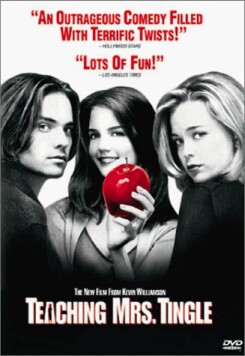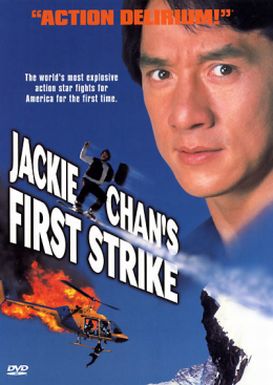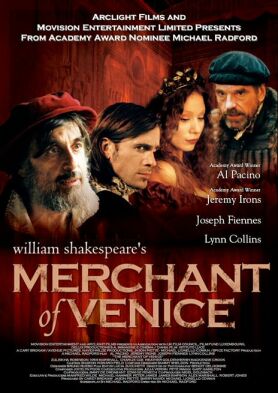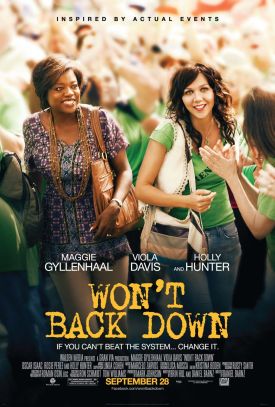Teaching Mrs. Tingle
It used to be almost a cliché: the toughest teacher you had in high
school was always the one you remembered as having given you the most, once you
grew up and learned to appreciate it. Nowadays, however, we believe neither in growing up ourselves nor in expecting our kids to grow up. Our kids do grow up nevertheless, of course. Eventually.
But adulthood for their baby-boom parents is too much like childhood for them to
be able to do much to interfere with the assumption of most kids that they will be
taking their teenage culture and their teenage attitudes with them to the grave — or rather some vaguely graveless future in Never-never Land. Nor would they if they could, so long as money is to be made. Hence Teaching Mrs Tingle, the directorial debut of an alleged adult
called Kevin Williamson who, as the writer of Scream and the TV series
“Dawson’s
Creek,” is obviously well-practised
at pandering to the teenage market.
Originally called Killing Mrs Tingle, the title and concept were
modified in the wake of the Columbine High School massacre. It is still a
loathsome movie, the latest example of
Hollywood’s attempted vindication of
adolescent paranoia about
“mean”
teachers who are really jealous of their pupils and want them to fail. In this
case the mean teacher, Mrs Eve Tingle (Helen Mirren), catches her goodie-goodie
pupil, Leigh Ann Watson (Katie Holmes) with a stolen copy of the history final
exam paper. Actually, the class bad boy, Luke Cherner (Barry Watson), was the
one who stole the exam and had only been trying to corrupt Leigh
Ann’s innocence as a joke, but Mrs
Tingle prefers to believe that Leigh Ann was cheating.
“You just want to see me
fail!” wails Leigh Ann.
“It’s
your destiny,” agrees Mrs T, who has
also endangered her scholarship prospects by giving a C to Leigh
Ann’s history project, an incredibly
painstaking effort to produce a facsimile of the journal of a
17th century girl accused of witchcraft in
Salem.
In fact, a C seems generous to me, since Leigh Ann has obviously made no
effort to imagine her 17th century counterpart
as anything other than a clone of herself. Mrs Tingle is also right on the money
when she characterizes the history project of Leigh Ann’s best friend, Jo Lynn
(Marisa Coughlin), an impersonation of Marilyn Monroe as John F. Kennedy’s
mistress, as a “nauseating distortion
of American history” based on
“not a shred of
evidence.” But Jo Lynn, Leigh Ann and
Luke, like Mr. Williamson, don’t see it this way. To them Mrs. Tingle is just
being “mean,” and so the three of them take advantage of an accident that
happens one evening while they are attempting to plead with her. They take her
hostage in her own home, keep her tied up there and attempt to blackmail her
into relenting.
If we are to believe that Mrs Tingle continues to teach only in order to
indulge her spite and hatred for her pupils, that they would do such a thing
might seem to be a pretty good explanation for her feelings. But to Mr
Williamson Mrs Tingle is really only jealous of the golden youth of Grandsboro,
the apparently hellish small town in which they live, because they have a chance
to get out of it, as she herself never managed to do. At one point in her
captivity, Mrs Tingle probes Leigh
Ann’s defenses by pointing out to her
that she is afraid: “You have lived
your whole life in that fear.” She has
never allowed Luke, or any other boy, to touch her for the same reason that she
is so meticulous about her homework: because she is desperately afraid of being
caught like her mother by marriage and family and Grandsboro. She
doesn’t want to end up as a waitress,
wearing a name tag. And Mrs Tingle then plays her trump card: she knows all this
about Leigh Ann because she had been in exactly the same position herself.
“I wrote the
book!” she says triumphantly.
“Oh my
God!” thinks Leigh Ann.
She’s right. And so she goes off
straightaway and loses her virginity to the hunky Luke.
Thus, in addition to being a self-indulgent fantasy, the film is also another
triumph for Hollywood’s vulgar
Freudianism, which holds that all evil in the world comes from sexual
“repression”
and therefore that the bitter Mrs Tingle who wants her pupils to fail must have
got that way by too long a career of suppressing the natural sex urge, or only
indulging it on the sly with the ridiculous and married Coach Wenchel (Jeffrey
Tambor). It is imperative that poor Leigh Ann should avoid the same fate. In the
original version of the movie, the one I saw at an advance screening, it ends
with her addressing her college
“writing”
class and smugly asserting that, because of her fictional
heroine’s
“new belief in herself, she triumphed
over Mrs Tingle. She was no longer the Salem witch destined to burn at the
stake.” But this ending was omitted
from the final version as being over the top even in the view of those who are
otherwise inclined to take adolescent persecution fantasies seriously — or
at least who pretend to be so inclined.
Discover more from James Bowman
Subscribe to get the latest posts to your email.






